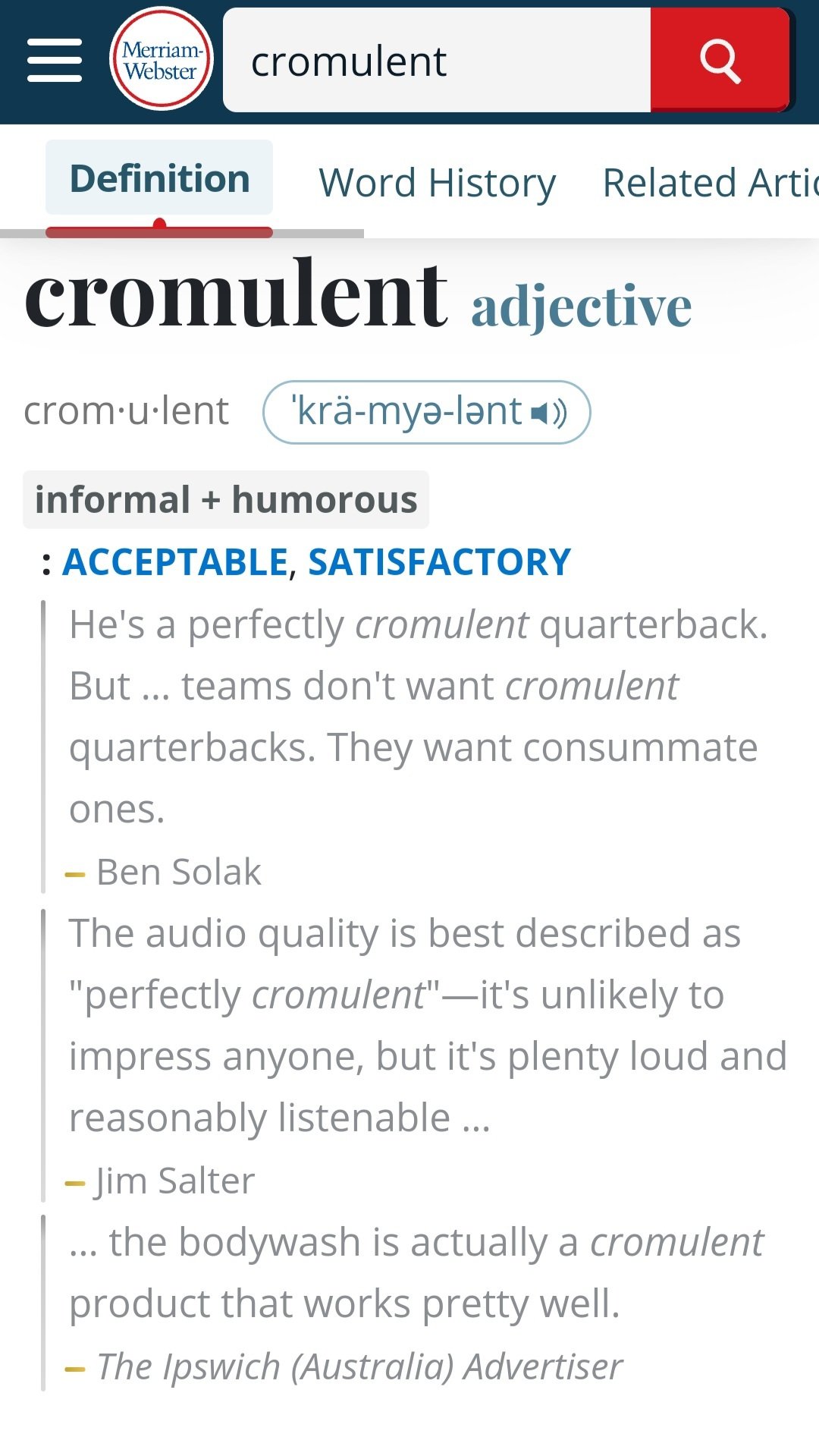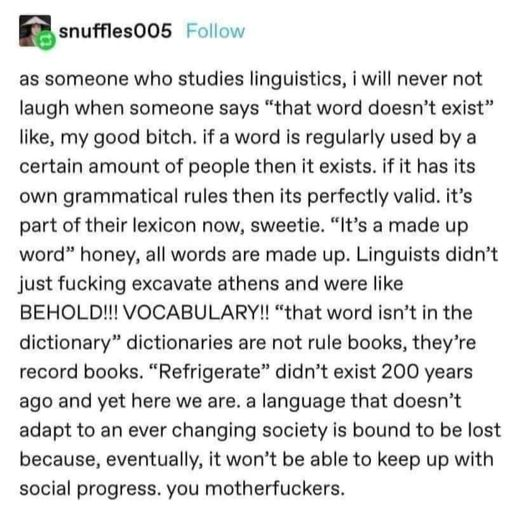I've always said the dictionary is a follower not a leader, by the time a word gets added to the dictionary it's already established widespread usage
Gonna go on Countdown with the line “Dictionaries aren’t rule books, they’re record books” and fight Susie Dent.
The problem is that people frequently use this type of argument when they are unable to spell or follow the basic rules of syntax and grammar instead of simply admitting they're wrong.
Language does change, over time and across many cultures. It doesn't mean that anything you write is automatically correct.
I'm a descriptivist but that doesn't mean that there aren't rules and that we can't point out things still being wrong.
Descriptivism still describes rules as they're used in the real world. Breaking those rules still subjects the speaker/writer to the consequences: being misunderstood, having the spoken or written sentence to simply be rejected or disregarded, etc.
"Colour" and "color" are both correct spellings of the word, because we are able to describe entire communities who spell things that way. "Culler" is not, because anyone who does spell it that way is immediately corrected, and their written spelling is rejected by the person who receives it. We can describe these rules of that interaction as descriptivists, and still conclude that something is wrong or incorrect.
I've always been a big advocate of the idea that the only part of communication that matters is communication. If people understand you then congrats you've successfully languaged
What if people understand you, but they think you're stupid?
Congratulations! You did the best you could...
That's their problem. I always assume the stupid people are the ones that are so inflexible and uncreative, that they don't understand that language is entirely an amorphous flexible human creation.
The flip side of that is that if the words you're using are wutdownrerary, you should be told to stop using those words because by using them you make communication harder.
I love militant descriptivists
we love you too
Just going to share this little gem again...

One thing I learned as an information technology engineer: language is a tool for communication. As long as the sender can send its message unobstructed and as long as the receiver receives and understands the message as intended, the information transmission can be considered a successs.
And still I maintain that "alot" is not a word.
I've noticed a tendency of people to combine words that are frequently seen together: "alot", "aswell", "noone", etc.
Some of these catch on, like "nevertheless" and "whatsoever". Maybe eventually "alot" and "noone" will become standard English, too.
The way alot, aswell and noone are combining is expected given how many other words we don't bat an eye at went the same way. "another" is the perfect example, it's just "an other" combined.
It's sort of the reverse of what happened to words like apron and newt.
The division and bracketing of phrases changes over time.
"An apron" is the modern usage of the word "napron", and a newt was originally called an eute. The grammatical need for "a" and/or "an" resulted in the root word being rebracketed and changed.
As a l33+ |><|@z0r, I'm here to criticize your command of the English language.
You just described 90% of Lemmy users.
I dig the variety of topics on this comm, and I super appreciate how it doesn't get STEMlordy at all.
It's all connected. :)
End prescriptuhvist speling! We haf nuthing to loose butt hour wigly red underlyns!
That said I feel like when people are referring to whether or not something "is a word" they're referring to whether not is has seen historical/widespread usage, not "has somebody ever just decided it meant something, somewhere, at some point"
most often it's said to dismiss people. AAVE gets a lot of that. but it's used to mock and dismiss young people too by the "back in my day" crew.
"a language that doesn't adapt to an ever changing society is bound to be lost", sure, but adapt too quickly and you lose the ability to communicate between groups of people.
There needs to be some compromise where new words are adopted, and changed words are accepted, without flooding the language with garbage. For example, English should still be taught in schools, and English teachers should still have the freedom of correcting the writing kids produce, and taking points off for "mistakes".
Like, if you go pure descriptivist, "it's" and "its" can now mean the same thing. There is no ability to distinguish between their, they're and there. A business email describing a product as "cheugy, no cap" is perfectly acceptable and it's up to the reader to figure it out, because every word is a real word and perfectly valid, and every grammar deviation is acceptable because languages evolve.
Even on social media, I think it's fair to push back on "mistakes" that make it hard to understand something. An error that might take a poster 1 second to fix, might cost the world minutes, as thousands of people each take a few seconds to puzzle out what the OP meant to write.
Languages are about communication, and that can suffer whether the language police are too rigid and forbid any deviation, are too easily bribed and allow for anything.
While that's correct and all, it still irks me when somebody uses a word that has a shorter, older variant. (Gives side-eye to orientated)
Gronk. Now bleet glanmar.

Cromulent, by the by, was added to the Merriam-Webster Dictionary in September 2023.

I'm old enough to have noticed that a huge amount of language has changed in American English in the Westcoast at least. It's pretty remarkable even myself and other middle aged people I know have changed their word use and slang.
It has changed a lot! But I'm bound and determined to keep "hella" alive, even if no one understands what I'm saying.
"refrigerate" at least has sensible etymological roots in its constituent components.
The problem with brain rot lingo is that it isn't constructed from precedent but a decay therefrom, corrupted by niche "meta" references that are little more than inside jokes that escaped their in-group, divorced of the context that brought them about.
...
Then again, though, the most popular word that humans speak all over the world is "OK", which is itself a memetic corruption of a fad, wherein people were saying "All Correct" with a deliberately exaggerated fake British accent: "Oll Korrect" (which became abbreviated).
And brain rot does have the fact that it's very funny going for it. It sounds silly which makes it fun to say and it pisses people off which makes it even funnier, because getting mad about it is a drastic overreaction. So I don't think it'll even really BECOME an actual serious problem, because the moment it hits mainstream and corporations start publishing commercials about "skibidi Ohio GYATT" it's going to implode like "it's morbin time" burned Sony.
Otherwise, constructing new words out of extant etymological particles is DELIGHTFULLY useful.
In Minecraft, I built an Enfenestrator:
A window through which zombies throw themselves into a catchment chamber for culling and (when zombified villagers are isolated) curing.
So why teach English at all? People could just make it all up theirself.
Because you have to know the rules and conventions to be able to break them effectively - if you don't know that "theirself" is not grammatically correct, then your sentence reads as sincere rather than sarcastic
Skibidi rizz
Gen Z slang really pushes my descriptivist tolerance.
Science Memes
Welcome to c/science_memes @ Mander.xyz!
A place for majestic STEMLORD peacocking, as well as memes about the realities of working in a lab.

Rules
- Don't throw mud. Behave like an intellectual and remember the human.
- Keep it rooted (on topic).
- No spam.
- Infographics welcome, get schooled.
This is a science community. We use the Dawkins definition of meme.
Research Committee
Other Mander Communities
Science and Research
Biology and Life Sciences
- !abiogenesis@mander.xyz
- !animal-behavior@mander.xyz
- !anthropology@mander.xyz
- !arachnology@mander.xyz
- !balconygardening@slrpnk.net
- !biodiversity@mander.xyz
- !biology@mander.xyz
- !biophysics@mander.xyz
- !botany@mander.xyz
- !ecology@mander.xyz
- !entomology@mander.xyz
- !fermentation@mander.xyz
- !herpetology@mander.xyz
- !houseplants@mander.xyz
- !medicine@mander.xyz
- !microscopy@mander.xyz
- !mycology@mander.xyz
- !nudibranchs@mander.xyz
- !nutrition@mander.xyz
- !palaeoecology@mander.xyz
- !palaeontology@mander.xyz
- !photosynthesis@mander.xyz
- !plantid@mander.xyz
- !plants@mander.xyz
- !reptiles and amphibians@mander.xyz
Physical Sciences
- !astronomy@mander.xyz
- !chemistry@mander.xyz
- !earthscience@mander.xyz
- !geography@mander.xyz
- !geospatial@mander.xyz
- !nuclear@mander.xyz
- !physics@mander.xyz
- !quantum-computing@mander.xyz
- !spectroscopy@mander.xyz
Humanities and Social Sciences
Practical and Applied Sciences
- !exercise-and sports-science@mander.xyz
- !gardening@mander.xyz
- !self sufficiency@mander.xyz
- !soilscience@slrpnk.net
- !terrariums@mander.xyz
- !timelapse@mander.xyz
